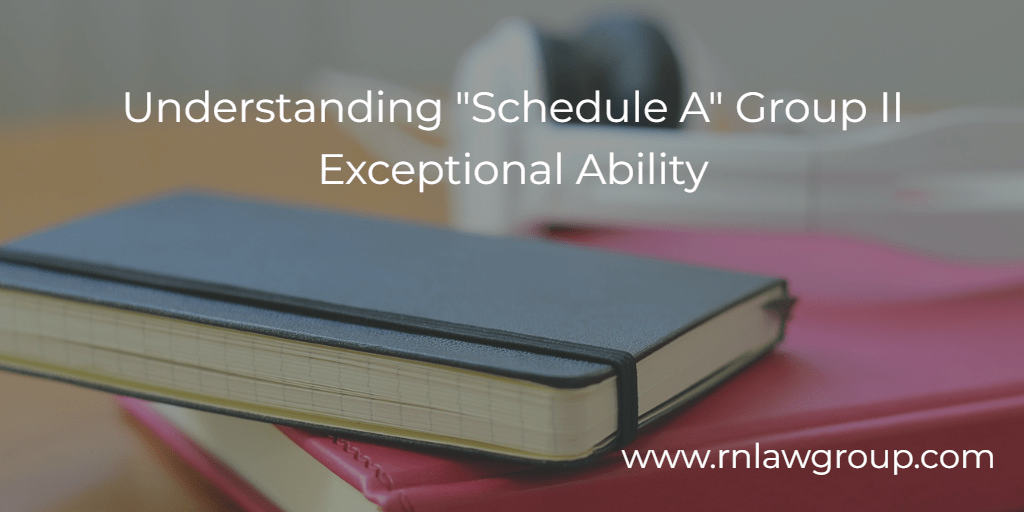
Understanding “Schedule A” Group II Exceptional Ability
Introduction
Navigating the U.S. immigration system can be complex, especially for employers looking to secure permanent residency for their foreign workers. Among the various pathways available, the Schedule A Group II designation offers a unique opportunity for individuals with exceptional abilities in the sciences, arts, and performing arts to bypass the labor certification process and file for an I-140 immigrant petition in the EB-2 or EB-3 category. This article aims to provide an in-depth understanding of Schedule A Group II, its criteria, and the application process.
Overview: Schedule A Designation Petition
A Schedule A designation is a provision by the Department of Labor (DOL) that pre-certifies certain occupations as having a shortage of U.S. workers who are able, willing, qualified, and available. This pre-certification allows employers to bypass the labor market test required for the PERM process when hiring foreign workers in these occupations. Generally, to qualify for any Schedule A designation (Group I or Group II), the following criteria must be met:
- Schedule A Occupation: The employment must be in a designated Schedule A occupation.
- Full-Time Employment Offer: Employer sponsorship is required and the job offer must be for full-time permanent employment.
- Prevailing Wage: The employer must obtain a prevailing wage determination (PWD) from the DOL’s National Prevailing Wage Center (NPWC). The prevailing wage rate is defined as the average wage paid to similarly employed workers in a specific occupation in the area of intended employment. The prevailing wage is the rate the employer must at least offer the permanent position at. It is also the rate that must be paid to the foreign national once the green card is received.
- Notice of Filing: A Notice of Filing (NOF) must be placed at the job site for ten consecutive business days. The purpose of the NOF is to alert other employees of the position the employer is seeking to fill under Schedule A.
- USCIS Eligibility Requirements: The foreign worker must meet the specific eligibility requirements for either the EB-2 or EB-3 category.
Schedule A occupations are divided into two groups:
Group I
- Physical therapists
- Professional nurses
Group II
- Immigrants of exceptional ability in sciences or arts (including college or university teachers of exceptional ability)
- Immigrants of exceptional ability in the performing arts
Schedule A Group II
Under the Group II category, foreign nationals must meet two sets of regulatory requirements set by USCIS and the DOL. Based on USCIS requirements, foreign nationals must qualify under either the EB-2 or EB-3 category. For EB-2, the position must require, and the foreign national must hold, a U.S. advanced degree or foreign equivalent (or Bachelors plus 5 years of experience) or demonstrate exceptional ability. For EB-3, the position must require, and the foreign national must meet, the qualifications for professional or skilled workers. Additionally, the DOL will require separate evidence that the foreign national meets their specific criteria for exceptional ability (which differs from the USCIS standards for EB-2 exceptional ability).
Simplified overview:
- USCIS:
- Advanced Degree, or Exceptional Ability for EB-2; or
- Professional or Skilled Worker for EB-3; and
- DOL definition of Exceptional Ability
Schedule A Group II Criteria for immigrants of exceptional ability in sciences or arts
USCIS issued a policy update in April 2024 to clarify the meaning of “science or art” for Schedule A, Group II occupations. This update aligns the definition with that of the DOL. By providing this clarification, the update broadens the scope of the Schedule A, Group II designation and may enhance employers’ ability to sponsor foreign workers under this category.
Foreign nationals with exceptional abilities in the sciences or arts may qualify for an immigrant visa under Schedule A Group II by meeting the following criteria:
- Widespread Acclaim and International Recognition accorded by experts: The individual must have widespread acclaim and international recognition accorded by experts in their field. This is typically demonstrated through reference letters from recognized experts. These letters should address the claim of widespread acclaim and international recognition.
- Recent and Future Work Requirements: This requirement consists of three parts: (1) the foreign worker must have at least one year of experience; (2) their work during the past year required exceptional ability; and (3) their future work will continue to require exceptional ability. The one-year experience requirement can be demonstrated through a letter from an employer verifying the experience. The second and third parts can be shown with reference letters from recognized experts, some of which may already be used for the first prong. Additionally, the employer sponsoring the foreign worker will submit a letter confirming that exceptional abilities are necessary for the position.
- Regulatory Criteria: The foreign worker must meet at least two of the following seven regulatory criteria:
- Documentation of the foreign national’s receipt of internationally recognized prizes or awards for excellence in the field for which certification is sought;
- Documentation of the foreign national’s membership in international associations, in the field for which certification is sought, which require outstanding achievement of their members, as judged by recognized international experts in their disciplines or fields;
- Published material in professional publications about the foreign national, about the alien’s work in the field for which certification is sought, which shall include the title, date, and author of such published material;
- Evidence of the foreign national’s participation on a panel, or individually, as a judge of the work of others in the same or in an allied field of specialization to that for which certification is sought;
- Evidence of the foreign national’s original scientific or scholarly research contributions of major significance in the field for which certification is sought;
- Evidence of the foreign national’s authorship of published scientific or scholarly articles in the field for which certification is sought, in international professional journals or professional journals with an international circulation;
- Evidence of the display of the foreign national’s work, in the field for which certification is sought, at artistic exhibitions in more than one country.
Schedule A Group II Criteria for immigrants of exceptional ability in the performing arts
Foreign nationals with exceptional abilities in the performing arts also qualify under Schedule A Group II. These criteria include:
- Recent and Future Work Requirements: Similar to the sciences and arts, the foreign worker’s past year’s work and intended future work must require exceptional ability.
- Regulatory Criteria: The foreign worker must meet at least one of the following criteria:
- Documentation attesting to current widespread acclaim and international recognition, including receipt of internationally recognized prizes or awards for excellence.
- Published material by or about the foreign national, such as critical reviews or articles in major newspapers, periodicals, and trade journals.
- Documentary evidence of earnings commensurate with the claimed level of ability.
- Playbills and star billings.
- Documents attesting to the outstanding reputation of theaters, concert halls, nightclubs, or other establishments where the foreign worker has appeared or is scheduled to appear.
- Documents attesting to the outstanding reputation of theaters, repertory companies, ballet troupes, orchestras, or other organizations where the foreign worker has performed in a leading or starring capacity.
Application Process – Group II: Employers must submit an uncertified PERM application on ETA Form 9089 in conjunction with an I-140 immigrant petition directly to USCIS. The employer will complete an ETA Form 9089, establishing the foreign national’s qualifications. The employer will also submit all supporting documentation with the I-140 petition to prove that the EB-2 or EB-3 category is met and that the foreign national has exceptional ability per DOL regulations. Along with this documentation, employers will submit the NOF and PWD.
Conclusion
Schedule A, Group II offers a streamlined path for foreign nationals with exceptional abilities in the sciences, arts, and performing arts to gain permanent residency in the United States. By bypassing the traditional labor certification process, this designation simplifies the application process for employers seeking to sponsor highly skilled workers. With recent updates clarifying the definition of “science or art,” and clear criteria for proving exceptional ability, this pathway broadens opportunities for both employers and qualified foreign nationals. Successfully navigating the application process requires thorough documentation, including reference letters and proof of exceptional abilities, making it essential for both employers and foreign workers to carefully review all regulatory requirements and seek assistance from a qualified immigration attorney.
At Reddy Neumann Brown PC, we are fully committed to providing our clients with all the options available for employment based green card sponsorship, particularly in light of the challenges stemming from extended PERM processing times. If you have any inquiries, please schedule a consultation with one of our immigration attorneys.
By: Krystal Alanis
Krystal Alanis is a Partner at Reddy Neumann Brown PC with over 10 years of experience practicing U.S. business immigration law. Krystal manages the firm’s PERM Labor Certification Department, where she oversees all EB-2 and EB-3 employment-based green card matters. Krystal guides clients from a variety of industries through the maze of the PERM Labor certification process and has handled thousands of PERM applications throughout her career. Krystal guides employers through the I-140 and Adjustment of Status process, and assists clients with temporary work visas. Further, she oversees the firm’s I-9 compliance team where she advises employers regarding Form I-9 Employment Eligibility Verification requirements and conducts internal audits of a company’s I-9 records, processes, and procedures. Additionally, Krystal represents clients in Form I-9 U.S. Immigration and Customs Enforcement (ICE) inspections (Notice of Inspection). Krystal successfully settled a claim with ICE over Form I-9 substantive paperwork violations that led to an 88% reduction in civil fines for her client.

